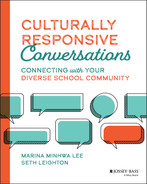CONCLUSION
This book has shared a wide array of research and many anecdotes on students and families coming from different cultural backgrounds that can reflect certain patterns of behavior, beliefs, and perceptions of the world. We hope the information will be useful for educators seeking to develop better relationships with their students, families, colleagues, and other stakeholders within their school community.
We wanted to close with a final anecdote from a high school student of ethnic Korean descent, “Ben.”
During Ben's health class, the teacher, “Mr. K,” was reviewing the effects of alcohol on adolescent and teenage brain development. As part of the teacher's dialogue with a highly multicultural class, he asked students from around the room about the drinking ages in their “home” countries.
He started with Jakub from Poland, who responded with, “18 years old, Mr. K.”
Mr. K. continued, pointing to a boy from Ghana, “How about you, Abam?”
“18, as well.”
“And Anna, how about Austria?”
“I think I'd say 16,” Anna replied.
Mr. K went on and turned toward Ben. “Ben, what's the drinking age in Asia?”
Ben was about to respond, then paused as Mr. K.'s phrasing sank in.
Seconds went by that felt like minutes.
Ben recognized that the teacher knew he was ethnically Korean, but he was not asking about Korea but all of Asia. Though Ben was sure that Mr. K was aware that Asia was a continent, not a country, his skin color and facial appearance led him to make this slip.
As Ben knew Mr. K well and respected his friendliness and subject knowledge, he didn't feel deeply offended by the microaggression, but did feel a bit saddened by the reality of the world of categorizations and stereotypes. To others, he was Asian first and always would be. He wasn't Ben, the talented oboist who spoke three languages fluently (Korean wasn't one of them). Despite leaving Korea when he was two months old, he was still “stuck” in the eyes of even well-intentioned teachers like Mr. K.
Mr. K coughed gently, bringing Ben out of this series of realizations. At that moment, Ben knew exactly how to respond.
“I wouldn't know, Mr. K, I'm from Argentina.”
The point of this story, and, indeed, the message of this book, is that our understanding of cultural backgrounds should only, and in fact can only, serve as general advice for possible ways to interact more successfully.
Even the most well-intentioned and well-prepared educator will make a faulty assumption, rush to judgment, or say the wrong thing. Attempting to understand and appreciate the core beliefs and values that may alter the perceptions and communications is a noble endeavor, but also one with an inherent possibility of error, which many parents will understand.
We all wish to serve students and families as best we can, which means understanding there will always be exceptions—and sometimes can become the new norm—as individual experiences are shaped by innate traits, socioeconomic class, gender, age, family ties, travel, relocations, and more.
This is what's most exciting about attempts to better interact with other cultures—it requires celebrating what makes us educators: the ability to change, adapt, and embrace the beauty of the world and the people who live in it together with us.
